Extra Credit Opportunity, 10/31, 1-3pm
27/10/14 22:34
I will be happy to give extra credit to any students who are able to attend Prof. Akiko Takeyama’s talk on Friday.
Jointly Sponsored by the Department of Anthropology
The East Asia Center Presents
October 31st 1-3pm
Brooks Hall Second Floor Conference Room
Staged Seduction: Gender Politics and Class Struggle in a Tokyo Host Club
Associate Professor, Anthropology and Women, Gender & Sexuality Studies
University of Kansas
Abstract: Staged Seduction is an ethnographic study of the acclerating commercialization of feelings, emotions, and intimate relationships - what I call "affect economy" - at the intersection of Japan's postindustrial consumerism and neoliberal reforms. I investigate Japan's host club scene, where young working class men "sell" staged seduction, romance, and sometimes sex to their female clients for exorbitant sums of money. I use the host club scene as a window into social processes of emotional adjustment (or, what feminist sociologist Arlie Hochschild calls "emotion work") to new forms of temporarily, individuality, and hopes and dreams in contemporary Japan. I argue that the emotional adjustment is largely capitalized on to feed into individual satisfaction, service sectors, and national reconstructuring. My ethnography demonstrates the affect economy whereby men and women's intensified feelings, emotions, and desires are commercially staged and culturally negotiated with and against a neoliberal sense of individual wellbeing, freedom, and accountability.
Refreshments will be served. All are welcome!
Jointly Sponsored by the Department of Anthropology
The East Asia Center Presents
October 31st 1-3pm
Brooks Hall Second Floor Conference Room
Staged Seduction: Gender Politics and Class Struggle in a Tokyo Host Club
Associate Professor, Anthropology and Women, Gender & Sexuality Studies
University of Kansas
Abstract: Staged Seduction is an ethnographic study of the acclerating commercialization of feelings, emotions, and intimate relationships - what I call "affect economy" - at the intersection of Japan's postindustrial consumerism and neoliberal reforms. I investigate Japan's host club scene, where young working class men "sell" staged seduction, romance, and sometimes sex to their female clients for exorbitant sums of money. I use the host club scene as a window into social processes of emotional adjustment (or, what feminist sociologist Arlie Hochschild calls "emotion work") to new forms of temporarily, individuality, and hopes and dreams in contemporary Japan. I argue that the emotional adjustment is largely capitalized on to feed into individual satisfaction, service sectors, and national reconstructuring. My ethnography demonstrates the affect economy whereby men and women's intensified feelings, emotions, and desires are commercially staged and culturally negotiated with and against a neoliberal sense of individual wellbeing, freedom, and accountability.
Refreshments will be served. All are welcome!
Slaying the Dragon, Reloaded
17/10/14 10:40
Here is the documentary film I mentioned in class, an analysis of American media images of Asian and Asian American women. I uploaded the film onto Collab (in the regular spot for films) and I’d be interested to hear any responses you have if you watch it.
Inventing the Samurai
17/10/14 10:38
I thought this new book looks interesting and might be of particular interest for a number of people in this class --

Publisher's blurb: "Inventing the Way of the Samurai examines the development of the 'way of the samurai' - bushidō - which is popularly viewed as a defining element of the Japanese national character and even the 'soul of Japan'. Rather than a continuation of ancient traditions, however, bushidō developed from a search for identity during Japan's modernization in the late nineteenth century. The former samurai class were widely viewed as a relic of a bygone age in the 1880s, and the first significant discussions of bushidō at the end of the decade were strongly influenced by contemporary European ideals of gentlemen and chivalry. At the same time, Japanese thinkers increasingly looked to their own traditions in search of sources of national identity, and this process accelerated as national confidence grew with military victories over China and Russia. Inventing the Way of the Samurai considers the people, events, and writings that drove the rapid growth of bushidō, which came to emphasize martial virtues and absolute loyalty to the emperor. In the early twentieth century, bushidō became a core subject in civilian and military education, and was a key ideological pillar supporting the imperial state until its collapse in 1945. The close identification of bushidō with Japanese militarism meant that it was rejected immediately after the war, but different interpretations of bushidō were soon revived by both Japanese and foreign commentators seeking to explain Japan's past, present, and future. This volume further explores the factors behind the resurgence of bushidō, which has proven resilient through 130 years of dramatic social, political, and cultural change."

Publisher's blurb: "Inventing the Way of the Samurai examines the development of the 'way of the samurai' - bushidō - which is popularly viewed as a defining element of the Japanese national character and even the 'soul of Japan'. Rather than a continuation of ancient traditions, however, bushidō developed from a search for identity during Japan's modernization in the late nineteenth century. The former samurai class were widely viewed as a relic of a bygone age in the 1880s, and the first significant discussions of bushidō at the end of the decade were strongly influenced by contemporary European ideals of gentlemen and chivalry. At the same time, Japanese thinkers increasingly looked to their own traditions in search of sources of national identity, and this process accelerated as national confidence grew with military victories over China and Russia. Inventing the Way of the Samurai considers the people, events, and writings that drove the rapid growth of bushidō, which came to emphasize martial virtues and absolute loyalty to the emperor. In the early twentieth century, bushidō became a core subject in civilian and military education, and was a key ideological pillar supporting the imperial state until its collapse in 1945. The close identification of bushidō with Japanese militarism meant that it was rejected immediately after the war, but different interpretations of bushidō were soon revived by both Japanese and foreign commentators seeking to explain Japan's past, present, and future. This volume further explores the factors behind the resurgence of bushidō, which has proven resilient through 130 years of dramatic social, political, and cultural change."
American Bento Humor
13/10/14 09:54
Katie sends this in...
I happened to come across this article or blog post online about an American mother attempting a bento box. It has a little profanity but I found it interesting to see the bento box concept in an American context. If you have a free minute you might find it comical as well.
I happened to come across this article or blog post online about an American mother attempting a bento box. It has a little profanity but I found it interesting to see the bento box concept in an American context. If you have a free minute you might find it comical as well.
Dark Side of the Rainbow
12/10/14 09:49
Responding to something we mentioned briefly in class on Thursday, Eli send this in.
As is mentioned in the comments, the sync between the music and the video doesn’t seem great to me, but you get the idea and you could always just set it up yourself. Also, who knows how true Wikipedia is, but I’m struck by the dates. I remember someone in my college dorm, in 1997-8, suggesting we do this, which probably means he must have just seen it on MTV?
Dark Side of the Rainbow from Klug on Vimeo.
As is mentioned in the comments, the sync between the music and the video doesn’t seem great to me, but you get the idea and you could always just set it up yourself. Also, who knows how true Wikipedia is, but I’m struck by the dates. I remember someone in my college dorm, in 1997-8, suggesting we do this, which probably means he must have just seen it on MTV?
Herbert Bix on Hirohito
30/09/14 08:46

Hirohito: String Puller, Not Puppet
By HERBERT P. BIXSEPT. 29, 2014
- CAMBRIDGE, Mass. — LAST month, I received a startling email from an employee at one of Japan’s largest newspapers, about a development I’d long awaited. The government was about to unveil a 12,000-page, 61-volume official biography of Emperor Hirohito, which a large team of scholars and civil servants had been preparing since 1990, the year after his death.
But there was a condition: I could not discuss Hirohito’s “role and responsibility” in World War II, which would be strictly outside the scope of the newspaper’s reporting. Having devoted years of my life to examining precisely this topic, I politely refused.
Full story here.
Authority, Race, and Language
25/09/14 20:27
Kuni came across a commercial that seemed ripe for analysis. Here is it with his analysis below. This situation also reminds me of how commercials (supposedly) use female announcers when they want to persuade and male announcers when they want to tell that doing / buying X is right, i.e. women are not as explicitly authoritative as men.
Stupidest gadget in laundry history (Sentakusijou saikou ni bakageta oosouchi).
You cannot miss it! (Minogasunante arienai!)
By P & G
Titled as “Beautiful Life”, this TV commercial features a White male scientist talking about a philosophy of life. His main theme is: you get unexpected dirt (or stains etc.) in your daily lives, and how effective Ariel (=their detergent) is to wash it out. Being spent 400,000 USD for the fabrication cost, this commercial projects innovative triangle of human, dirt, and the detergent.
According to him, life, is like a rolling stone. Once you start, you cannot go back. He then goes over the basic activities of mankind: eating, inventing & producing, and having fun. Each scene is accompanied with unexpected dirt (sauce, mud splashed by the car, and red-wine stain). He asserts that life and dirt cannot be separated…BUT! We do not need to worry or feel depressed. We have Ariel. This detergent, which is a crystal of science, washes everything out. Without breach, life starts to shine again.
“You cannot start over your life again; however, you can wash again anytime”
BEAUTIFUL LIFE WITH ARIEL
It could be a good showcase of the intersection of language, race, gender, science, and culture.
Stupidest gadget in laundry history (Sentakusijou saikou ni bakageta oosouchi).
You cannot miss it! (Minogasunante arienai!)
By P & G
Titled as “Beautiful Life”, this TV commercial features a White male scientist talking about a philosophy of life. His main theme is: you get unexpected dirt (or stains etc.) in your daily lives, and how effective Ariel (=their detergent) is to wash it out. Being spent 400,000 USD for the fabrication cost, this commercial projects innovative triangle of human, dirt, and the detergent.
According to him, life, is like a rolling stone. Once you start, you cannot go back. He then goes over the basic activities of mankind: eating, inventing & producing, and having fun. Each scene is accompanied with unexpected dirt (sauce, mud splashed by the car, and red-wine stain). He asserts that life and dirt cannot be separated…BUT! We do not need to worry or feel depressed. We have Ariel. This detergent, which is a crystal of science, washes everything out. Without breach, life starts to shine again.
“You cannot start over your life again; however, you can wash again anytime”
BEAUTIFUL LIFE WITH ARIEL
It could be a good showcase of the intersection of language, race, gender, science, and culture.
The Slow Way Home
24/09/14 09:21
This is the trailer for a documentary film produced by Len Schoppa, Professor of Politics here at UVA. Unfortunately for us, the film won’t be finished by the end of the semester, but he shared the trailer and I thought you all might be interested, too.
If you’re interested in the film’s topic, you might check out an article he wrote about it: “Residential Mobility and Local Civic Engagement in Japan and the United States: Divergent Paths to School,” Comparative Political Studies 46:9 (September 2013), pp. 1058-1081.
If you have any comments or questions, please email them to me and I’m happy to pass them along to Prof. Schoppa.
If you’re interested in the film’s topic, you might check out an article he wrote about it: “Residential Mobility and Local Civic Engagement in Japan and the United States: Divergent Paths to School,” Comparative Political Studies 46:9 (September 2013), pp. 1058-1081.
If you have any comments or questions, please email them to me and I’m happy to pass them along to Prof. Schoppa.
9/26 - Comix East and West
22/09/14 22:11
I’m happy to give extra credit to students who are able to attend this talk on Friday, 9/26.
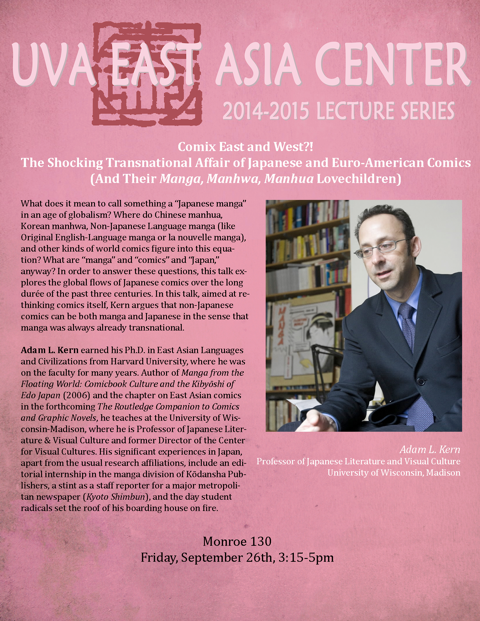

Name that Brand!
07/09/14 20:28
After our recent reading and discussion about English in Japan, or Japanese English, Christian took the time to write out some very compelling thoughts and questions --


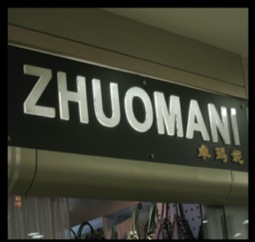
These humorous misspellings of well-known designer brands can be found in an unregulated marketplace in Guangzhou, China. The marketplace sells pirated imitations of brandname goods and uses these misspellings to avoid harassment from copyright.
From an insensitive western perspective these signs express Chinese submission to Italian brandnames, or to generalize more, Asian submission to Western innovation in business. When my class watched this TED Talk last year we thought it was hilarious that a Chinese black marketplace would adopt such imitations.
Reading the article about Japanese English reminded me of these articles, especially the concept that a borrowed word could have more modern connotations in Japan. This has brought me around to the pretty obvious conclusion that even if these businesses are not legitimate, rallying around known brands gives them draw, lets them create associations that can potentially change consumer apprehensions from negative to positive. It’s not content that matters, just the first impression.
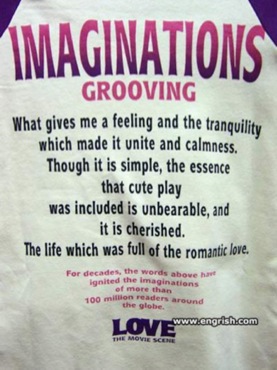
Look at this shirt. It’s not fully comprehensible…but consider the tone set by the key words “Imaginations” and “Grooving.” Both of these words have a peaceful, optimistic quality about them. Plus the cool pink and purple makes the shirt easy on the eyes and matches the romance that the words allude to. The brand created by the presentation of the key words establishes a feeling of peacefulness and warmth.
Here’s something more. Native English speakers frequently wear shirts with broken English language on them. We let wearers of these shirts off the hook though...I’m referring to shirts advertising for bands or in particular albums. For example Blood Sugar Sex Magik by the Red Hot Chili Peppers is broken English, misspelled English. We excuse this because Blood Sugar Sex Magik is a title. But what do titles actually do? They set the tone of a work, they’re their own sort of brand. I don’t have a massive conclusion to draw from this, but if we recognize the right of native speakers to toy with a language then why shouldn’t non-native speakers be provided with the same right to make brands out of the language. Why be so elitist?




These humorous misspellings of well-known designer brands can be found in an unregulated marketplace in Guangzhou, China. The marketplace sells pirated imitations of brandname goods and uses these misspellings to avoid harassment from copyright.
From an insensitive western perspective these signs express Chinese submission to Italian brandnames, or to generalize more, Asian submission to Western innovation in business. When my class watched this TED Talk last year we thought it was hilarious that a Chinese black marketplace would adopt such imitations.
Reading the article about Japanese English reminded me of these articles, especially the concept that a borrowed word could have more modern connotations in Japan. This has brought me around to the pretty obvious conclusion that even if these businesses are not legitimate, rallying around known brands gives them draw, lets them create associations that can potentially change consumer apprehensions from negative to positive. It’s not content that matters, just the first impression.

Look at this shirt. It’s not fully comprehensible…but consider the tone set by the key words “Imaginations” and “Grooving.” Both of these words have a peaceful, optimistic quality about them. Plus the cool pink and purple makes the shirt easy on the eyes and matches the romance that the words allude to. The brand created by the presentation of the key words establishes a feeling of peacefulness and warmth.
Here’s something more. Native English speakers frequently wear shirts with broken English language on them. We let wearers of these shirts off the hook though...I’m referring to shirts advertising for bands or in particular albums. For example Blood Sugar Sex Magik by the Red Hot Chili Peppers is broken English, misspelled English. We excuse this because Blood Sugar Sex Magik is a title. But what do titles actually do? They set the tone of a work, they’re their own sort of brand. I don’t have a massive conclusion to draw from this, but if we recognize the right of native speakers to toy with a language then why shouldn’t non-native speakers be provided with the same right to make brands out of the language. Why be so elitist?

Another Article by Martin Fackler
07/09/14 10:21
What do you think?
To Draw in New Crowds, an Industry Bets on Itself
Pachinko Parlors Court Japan’s Youth
By MARTIN FACKLERSEPT. 6, 2014
NAGOYA, Japan — Part pinball and part roulette, with the lure of quick cash winnings and little silver balls ricocheting off pins and bumpers, the Japanese game of pachinko once seemed a permanent feature of the nation’s postwar landscape, its arcade-style sounds and lights providing a blinking, cacophonous backdrop to life in Japan during the boom years.
In recent years, though, one pachinko hall after another has shut its doors as legions of loyal fans aged and passed away, the industry was tainted by mob ties and — perhaps the biggest turnoff for Japanese youth — the game acquired the musty scent of an artifact of their parents’ generation.
Now, like Japan itself, pachinko is attempting a comeback.
Full story is here, including pictures.
To Draw in New Crowds, an Industry Bets on Itself
Pachinko Parlors Court Japan’s Youth
By MARTIN FACKLERSEPT. 6, 2014
NAGOYA, Japan — Part pinball and part roulette, with the lure of quick cash winnings and little silver balls ricocheting off pins and bumpers, the Japanese game of pachinko once seemed a permanent feature of the nation’s postwar landscape, its arcade-style sounds and lights providing a blinking, cacophonous backdrop to life in Japan during the boom years.
In recent years, though, one pachinko hall after another has shut its doors as legions of loyal fans aged and passed away, the industry was tainted by mob ties and — perhaps the biggest turnoff for Japanese youth — the game acquired the musty scent of an artifact of their parents’ generation.
Now, like Japan itself, pachinko is attempting a comeback.
Full story is here, including pictures.
More National Character and What Is News
06/09/14 12:27
It was striking to me that this article, which seems to be about the advancement of Kei Nishikori to the US Open (tennis) semnifinals, is most concerned with the suicide of a player 80 years ago. In a most positive light, I can imagine that a(nother) story about Japanese suicide is perhaps more interesting than the story of what I imagine to be Nishikori’s hard work and daily practices. But, still, the New York Times has given us another example of national character. Certainly suicide is always sad but this one (in 1933) is described in ways that fail to acknowledge the war that Japan was involved in at the time, let alone explain how that suicide is Nichikori’s success are linked.
Another way to say it: how much would it suck if you’d just advanced to the US Open semifinals and the article about you was actually about some guy committing suicide decades before you were born?
Hope for Japan, Decades After a Disturbing Loss
By BEN ROTHENBERG SEPT. 5, 2014
On Saturday afternoon at the United States Open, Kei Nishikori will become the first Japanese man to compete in a Grand Slam singles semifinal in 81 years.
The man who preceded him, Jiro Satoh, reached five major semifinals, the last one at Wimbledon in 1933, when he was 25. The next year, Satoh threw himself off the side of a ship in the darkness of night and drowned in the Strait of Malacca.
Satoh was traveling with his Davis Cup teammates to England for a competition against the Australian team, followed by Wimbledon. Feeling unwell, he asked to be allowed to stop his journey after visiting a doctor when the vessel stopped in Singapore. The doctor, however, cleared him to continue.
Hours after the ship left port, his teammate Jiro Yamagishi returned to their cabin and saw that Satoh was missing.
Full story is here.
Another way to say it: how much would it suck if you’d just advanced to the US Open semifinals and the article about you was actually about some guy committing suicide decades before you were born?
Hope for Japan, Decades After a Disturbing Loss
By BEN ROTHENBERG SEPT. 5, 2014
On Saturday afternoon at the United States Open, Kei Nishikori will become the first Japanese man to compete in a Grand Slam singles semifinal in 81 years.
The man who preceded him, Jiro Satoh, reached five major semifinals, the last one at Wimbledon in 1933, when he was 25. The next year, Satoh threw himself off the side of a ship in the darkness of night and drowned in the Strait of Malacca.
Satoh was traveling with his Davis Cup teammates to England for a competition against the Australian team, followed by Wimbledon. Feeling unwell, he asked to be allowed to stop his journey after visiting a doctor when the vessel stopped in Singapore. The doctor, however, cleared him to continue.
Hours after the ship left port, his teammate Jiro Yamagishi returned to their cabin and saw that Satoh was missing.
Full story is here.
East Asian Image Collection
31/08/14 17:25
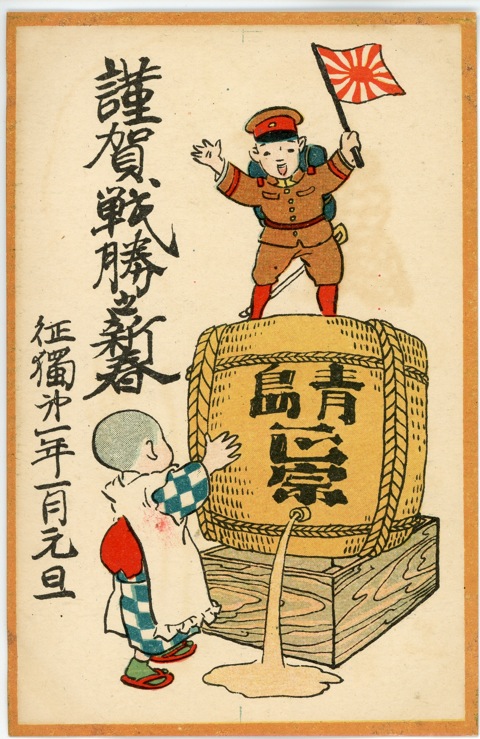
Paul Barclay, a fantastic historian of colonial Japan, has created a spectacular resource in this digital collection of representations of visual cultural in imperial East Asia.
Check out this amazing collection of various postcards and the blog associated with the project.
Especially for students with interest in Japanese colonial expansion, these collections will be a truly absorbing resource.
More Japan Dropping Examples
27/08/14 09:26
Glenn sends in this example --
Lyrics here.
Alex sends this --
as well as this, which seems like a very different kind of video --
I don’t know as much as you might, but it seems to me that the voice of the song, quite literally, is transposed onto / into a Japanese-looking woman who is moving through her Tokyo life.
Isabella sends in this interview with Tokyo Police Club, in which they describe picking their name this way:
How did you come up with the name Tokyo Police Club? A study was conducted to find out if a band's name can correlate to their success. And so a computer formula took all the results of the study – what words showed up most frequently showed up in successful bands' names – and generated the ultimate fame-ensuring name: "Tokyo Police Club". The second choice was "Madonna Jackson Pac".
Lyrics here.
Alex sends this --
as well as this, which seems like a very different kind of video --
I don’t know as much as you might, but it seems to me that the voice of the song, quite literally, is transposed onto / into a Japanese-looking woman who is moving through her Tokyo life.
Isabella sends in this interview with Tokyo Police Club, in which they describe picking their name this way:
How did you come up with the name Tokyo Police Club? A study was conducted to find out if a band's name can correlate to their success. And so a computer formula took all the results of the study – what words showed up most frequently showed up in successful bands' names – and generated the ultimate fame-ensuring name: "Tokyo Police Club". The second choice was "Madonna Jackson Pac".
Gwen Stefani
27/08/14 09:12

In this context, Gwen Stefani deserves her own post. As background to these videos, a good place to begin is "English as a Second Language" by Anne Ishii in the Village Voice. Ishii compares Gwen's "harajuku girls" with the geisha played by Zhang Ziyi in "Memoirs of a Geisha" -- or "Sayuri" as it was released in Japan.
... "But even if God's wrath upon the Asian denizens of Babel is broken Engrish, at least it's not total silence. The Harajuku Girls are a quartet of dancers (at least one of whom is from California) on Gwen Stefani's solo music tour. They pose as avatars of the Tokyo neighborhood famous for being a spectacle of fashion and consumerism. Rumor has it that they were contractually obliged by Gwen Stefani (or her PR gurus) not to speak English while on tour, despite being fluent in the language. Love, Angel, Music, and Baby are, like the geishas in Memoirs, simply empty roles of Asian women who aren't allowed to speak openly. I hope that there is no doubt, but just to be clear, silencing people is the epitome of taking away their autonomy and subjectivity, even if Gwen Stefani thinks her silent Japanese fashionistas are part of an awesome and empowering counterculture. This raises the question: Why would an American entertainer who presumably knows cultural diversity (Stefani hails from a part of the O.C. not 10 minutes from my own provenance, where— unlike in the TV show—close to half the population is nonwhite) make such stupid demands specifically for Asian roles? What would be so wrong with Asian women speaking normally?"...
Margaret Cho had a fantastic short piece reacting to the Harajuku girls on her blog but it seem to have been removed. I'll do what I can to find the original, but for now here's a choice quote:
"I want to like [the Harajuku girls], and I want to think they are great, but I am not sure if I can. I mean, racial stereotypes are really cute sometimes, and I don't want to bum everyone out by pointing out the minstrel show. I think it is totally acceptable to enjoy the Harajuku girls, because there are not that many other Asian people out there in the media really, so we have to take whatever we can get. Amos 'n Andy had lots of fans, didn't they? At least it is a measure of visibility, which is much better than invisibility. I am so sick of not existing, that I would settle for following any white person around with an umbrella just so I could say I was there."
An interviewer for Entertainment Weekly asked Gwen Stefani specifically about Margaret Cho's piece -- and she was surely not the only one to write and think along these lines. Gwen seems to completely miss the point that it is quite possible to think that Japanese culture, and even Japanese people, are fun and still turn them into, to use Cho's evocative phrasing, "a silent minstrel show."
Gwen says:
''She didn't do her research!'' spits Stefani, who says she's been a fan of Japan and its mix-and-match fashion sense since first visiting the country with No Doubt in the mid-'90s. ''The truth is that I basically was saying how great that culture is. It pisses me off that [Cho] would not do the research and then talk out like that. It's just so embarrassing for her. The Harajuku Girls is an art project. It's fun!''
In the same article, the author included Cho's reaction to this quote, which is perhaps the best sarcasm I've read in a long time:
Cho responded via e-mail, ''I absolutely agree! I didn't do any research! I realize the Harajuku Girls rule!!! How embarrassing for me!!! I was just jealous that I didn't get to be one -- I dance really good!!!''
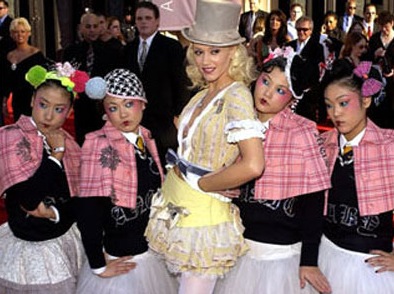
A few videos for your consideration -- with her the Japan doesn't end at a quick name-drop, either:

"Hollaback Girl" (2004). Apparently, the camera she uses at the opening of the video was sold as a limited edition "Harajuku Lovers" version by HP. Incidentally, what she says to the four women is "super cawaii" -- "cawaii" meaning "cute" in Japanese.
"Rich Girl" (2005) -- where the women start as girls playing with dolls
"Wind it Up" (2005) -- where the newly blond "Harajuku girls" seem to have become dolls themselves
Gwen's HP commercial, seemingly shot in Japan (2005)
Sweet Escape (2006) -- with Akon and only two of the "Harajuku girls," though four return in the following live performance of the same song.
Finally, this is live performance where the "girls" have been choreographed to, again, look like dolls and also seem to be worshiping Gwen, particularly at the beginning.
This is Your Brain on Screens
26/08/14 08:25

Despite my own use of technology in and out of the classroom, I have a strong restriction against students using laptops in class. At the beginning of the semester, I want to explain my reasoning behind this policy.
I believe that it is incredibly hard not to multi-task when you are sitting in front of a screen, be it a TV or computer screen. And, although multi-tasking might feel good to some people at some moments, every piece of evidence I have ever read or experienced convinces me of the opposite. Multi-tasking hinders listening, thinking, engagement, and learning, all of which I’m trying to maximize in the classroom.
For more on this topic, check out this article about the benefits of unplugging from technology and Nicholas Carr’s work on “how the Internet is making us stupid.”
I also realize I might need to explain the title of this post -- do I? Does that make any sense to you? Like everyone in my generation, I grew up seeing this commercial on TV. I feel like “This is your brain on drugs” might be phrase that people in your generation would recognize, too, but maybe not? Here’s what I’m talking about --
More on Dave Spector
24/08/14 17:28
You’ll meet David Spector in the first film we watch and, quite helpfully!, the New York Times just published this profile. I add it here thinking that it might be more interesting after you watch the film (in the second week).
American’s Star Power Unrivaled in Japan
TOKYO — DAVID SPECTOR is a relative unknown in his native Chicago, but here in Japan he is a household name. With his bleach-blond hair, and ability to deliver one-liners in flawless Japanese, Mr. Spector has been a fixture in this nation’s often raucous talk-show world for three decades, making him perhaps the most recognizable American living in Japan.
His celebrity is reflected in a grueling schedule. He appears on a regular circuit of “wide” shows, Japan’s rambling and highly animated daytime programs that showcase discussions on a range of celebrity gossip and current events. He stars in advertisements for a range of products, like American sneakers and chocolate bars. And he conducts TV interviews of visiting Hollywood glitterati while still finding time to think up a dozen fresh jokes each day to post on Twitter, where he recently topped a half-million followers.
Full article here.
American’s Star Power Unrivaled in Japan
TOKYO — DAVID SPECTOR is a relative unknown in his native Chicago, but here in Japan he is a household name. With his bleach-blond hair, and ability to deliver one-liners in flawless Japanese, Mr. Spector has been a fixture in this nation’s often raucous talk-show world for three decades, making him perhaps the most recognizable American living in Japan.
His celebrity is reflected in a grueling schedule. He appears on a regular circuit of “wide” shows, Japan’s rambling and highly animated daytime programs that showcase discussions on a range of celebrity gossip and current events. He stars in advertisements for a range of products, like American sneakers and chocolate bars. And he conducts TV interviews of visiting Hollywood glitterati while still finding time to think up a dozen fresh jokes each day to post on Twitter, where he recently topped a half-million followers.
Full article here.
What's funny and why
10/07/14 09:07
As we'll discuss in class, one interesting thing about the way Japan and Japaneseness is used in the US is that it's often a punchline. Here are two clips that use Japan -- or association with Japan -- as punch lines, although they do it in different ways.
Humor, more generally, is something we'll be talking and thinking a lot about, because Japan seems so, well, funny, in so many situations. What's this humor about? Why is this funny? I'll be very interested to hear your thoughts.
The first example, a scene from News Radio, a show broadcast in the 1990s, uses Japaneseness in a pretty standard way. As you'll see a character translates his book into Japanese and then translates it back, ending up, of course, with something that sounds like bad subtitles from a World War II battle movie crossed with a video game. Here, to me, it seems like what's funny is the confusing randomness of things translated from Japanese -- things like VCR instructions. (Remember VCRs? Ha ha ha.)
The second is a more recent clip from Saturday Night Live, in which the British actor / creator who starred in the UK "original" of The Office, talks about how the real original actually came from Japan. [I can’t find an embedded clip, but click to watch it.] This clip was interesting to me for at least a couple reasons. First, lots of people sent it to me, demanding to know what they're saying in Japanese. What's interesting is that they're not saying anything special -- literally they are just doing basic office chatter, saying "good morning," to each other, having a basic conversation. Yet, and importantly, it still seems funny. (Or does it? Is this skit funny to you?) The point seems to be that anything in Japanese is funny. Secondly, it struck me that the Japanese version is getting described as the "original." As we'll talk about in class, Japan and Japanese people are stereotypically represented (in the US as least, but other places as well) as copiers, as a culture that takes things and makes them into Japanese versions, but doesn't care about the context from which it comes. So, unusually, this seems to be one example in which the "Japanese version" (as fictional as it is) is represented as the "real" and "authentic" one.
Or is it as simple as Ricky Gervias says at the end -- "It's funny because it's racist"?
Humor, more generally, is something we'll be talking and thinking a lot about, because Japan seems so, well, funny, in so many situations. What's this humor about? Why is this funny? I'll be very interested to hear your thoughts.
The first example, a scene from News Radio, a show broadcast in the 1990s, uses Japaneseness in a pretty standard way. As you'll see a character translates his book into Japanese and then translates it back, ending up, of course, with something that sounds like bad subtitles from a World War II battle movie crossed with a video game. Here, to me, it seems like what's funny is the confusing randomness of things translated from Japanese -- things like VCR instructions. (Remember VCRs? Ha ha ha.)
The second is a more recent clip from Saturday Night Live, in which the British actor / creator who starred in the UK "original" of The Office, talks about how the real original actually came from Japan. [I can’t find an embedded clip, but click to watch it.] This clip was interesting to me for at least a couple reasons. First, lots of people sent it to me, demanding to know what they're saying in Japanese. What's interesting is that they're not saying anything special -- literally they are just doing basic office chatter, saying "good morning," to each other, having a basic conversation. Yet, and importantly, it still seems funny. (Or does it? Is this skit funny to you?) The point seems to be that anything in Japanese is funny. Secondly, it struck me that the Japanese version is getting described as the "original." As we'll talk about in class, Japan and Japanese people are stereotypically represented (in the US as least, but other places as well) as copiers, as a culture that takes things and makes them into Japanese versions, but doesn't care about the context from which it comes. So, unusually, this seems to be one example in which the "Japanese version" (as fictional as it is) is represented as the "real" and "authentic" one.
Or is it as simple as Ricky Gervias says at the end -- "It's funny because it's racist"?

